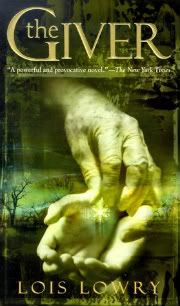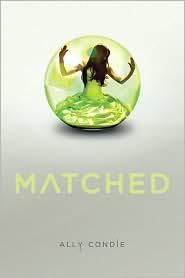Weekend Update: The Giver versus Matched

I bet some of you thought this post would NEVER come, didn't you? I'd intended to get this up shortly after posting my review of The Giver, but due to the holidays and other reviews, it just didn't happen. This morning, I found myself stumped about what I wanted to talk about, and I glanced at my copy of The Giver and realized now would be a good time to share my thoughts on the similarities between it and Ally Condie's Matched. Mind you, it's now been a while since I've read either book, so neither book is fresh in my mind, but that's a good thing, because I'm not going to be biased one way or the other.
Before starting this comparison, let's get a few links out of the way so you have them to refer to.
1) My review of The Giver: here.
2) My Review of Matched: here.
3) My initial reaction to learning how the books were similar: here.
4) The Book Smugglers' review of Matched: here.
5) The Book Smuggers' review of The Giver: here.
Now, I'll be honest: I haven't really gone out of my way to read interviews by Ally Condie, or read her blog, or any such thing. She might've claimed somewhere that one of her biggest inspirations was Lowry's The Giver, or maybe she's not said a word. I honestly don't know (and if you do know for a fact, feel free to share). I want to make it clear that I'm making no accusations of plagiarism here (because that's a pretty serious charge that shouldn't be thrown around lightly), but rather, I'm making comparisons. I should also note that I will not spoil EITHER BOOK. But some of these similarities could be considered by some super-spoiler-sensitive people to be spoilers, so skip to "My Verdict" if you're REALLY worried. But seriously, I'm not spoiling anything. I promise.
At first glance, it is startling to see how much of the world-building is the same. You have an apparent utopic society/community that's very rule-driven with officials observing every movement made by everyone to make sure all rules are being followed. But neither are Big Brother tales of fear: the observations are in place to help determine who belongs in what jobs, to make sure everything's going well, and there's never really a paranoid fear that permeates the characters about being watched. In Matched, the heroine has more fear about being watched because she start intentionally breaking the rules and she's trying to cover her tracks, but the difference between these two societies and that in Orwell's 1984 is that in the latter, you immediately knew you were reading a dystopia of a screwed up world. People weren't happy. In The Giver & Matched, people are very happy, as are the protagonists, at least until an elderly gentlemen who's managed to hold on to a scrap of the past comes along and allows the young protagonist to view his/her world through different eyes.
For Jonas of The Giver, it's a literal opening of the eyes. During his time with the old man, the Giver of his community, he starts to see the world around him as it really is. The blinders are taken off, and he sees a world of color but devoid of emotion, where words are carefully chosen so that you say what you mean and mean what you say, but also so that people can mislead others. Jonas learns what being let go from the community really means, and it's horrifying. It's that realization that inspires him to try and change his community.
For Cassia of Matched, it's all metaphorical, when her grandfather passes along banned texts and these texts start making her think of ideas that Society' conditioned her against. These ideas make her start thinking about her future (which is quite promising) if she plays by the rules, or the what it will mean if she doesn't, if she chooses to follow her heart instead.
Both societies repress emotion. In The Giver, it's quite literal: upon puberty, you have to take a certain pill every morning, and my reading was that said pill represses lust and desire. Other readers have taken it to mean the overall palette of emotion in general, and indeed, we do see how characters feel the surface of things, but not the true passionate roots of those feelings. In Matched, characters have three pills they carry around with them at all times. I'm forgetting what the green one does, but the yellow is used for when characters feel overwhelmed, like they can't handle it. I took this as a kind of anxiety/depression, with the yellow pill combating those feelings. But characters aren't forced to take those pills. The only one they HAVE to take is the red one, and that's only if an official tells them to, and what that pill does, well, let's just say it has nothing to do with emotion.

There are other similarities: there IS in The Giver, there is a "Matching of Spouses" that one can put one's name into. It's no Matching Ceremony like in Matched. In Lowry's world, you can put your name in the hat and wait for years while Elders find just the right person for you, whereas in Condie's world, you reach an age, decide you want a life-partner, and attend your Matching Ceremony. I wish the names of the two weren't so strikingly similar, even though if you were to ask me point blank, I couldn't tell you what Condie should've used instead.
There's a special ceremony for the Elderly too, right before they're released (in Giver) or die (in Matched). The whole thing feels very similar, though in The Giver, it's not the family focused affair that it is in Matched.
Profession is chosen by the City Elders in The Giver, and this is the BIG ceremony of this book, when you learn what profession you'll be training for. The BIG ceremony in Matched was, of course, the Matching Ceremony, where you get your life partner, and in both books, there's a hiccup in the process when it's the protagonist's time to learn what their future holds. It's a little similarity, but still striking if you're reading the books close together.
Let's be honest about a few things: in dystopias, highly regulated society seems to be the rule rather than exception. It's no stretch of the imagination to imagine a HIGHLY REGULATED society forcing us to live by curfews, and regulating our nutrition. And once you go that far, is it hard to imagine a HIGHLY REGULATED society that would NOT regulate child birth, let alone who rears the children? And what about marriages? Why wouldn't a HIGHLY REGULATED society regulate such a thing? Profession? Let's be honest: the point of a dystopia is that it's MEANT to be utopia, and the answer to utopia is always some form of control and sameness. Diversity and freedom can't be allowed in a "utopia" because that can cause strife. And people make bad decisions. If you can prevent someone from making a bad decision, why not do so?
I think the need for any utopia/dystopia is to take a problem the world is facing now, postulate a future where said problem doesn't exist and show the reasons why, and then turn the solution on its head to show why it's important the problem is ALLOWED to happen to begin with. The Giver was published in 1993, and I'm sure a better history buff than myself can look at the book and see what Lowry was working with, and if I had to hazard a guess, I would lean towards the dangers of war and discord and what it would take to keep such things out of society. With Matched, the cynical side of me says Condie's cashing in on the uber-popular trend of YA love triangles, but to be charitable, let's look at the real world, where people make bad relationship decisions all the time, you know? But in truth, I don't think that's what inspired Condie. I don't think Condie was looking at the world around us, I think she was looking at the world of The Giver and wanting to push it in a different direction.
If you're a writer, I know you know what I'm talking about, but I think even readers can relate: have you ever read a book and noticed a little thing about the world-building and fallen in love with that little detail? It doesn't play a role in the story, but it lingers with you to the point where you really, really, really wish the author had somehow incorporated the detail into the story MORE, and if not that, maybe hope the author would write a book focusing on just that detail. Now, as I said earlier, I know nothing of Condie's inspirations behind writing Matched, but I wouldn't be surprised if she'd read The Giver once upon a time ago and latched on to the idea of Matching of Spouses and decided to write her own dystopia where THAT was the driving force of the story: what does it mean when your spouse is chosen for you, and you fall in love with someone else? If I continue with this theory, that the inspiration behind Matched is a reaction (and perhaps an homage) to The Giver, then it wouldn't surprise me either if Condie made a willful decision to keep everything as reality-based as possible for her book. The Giver does have a rather magical-realist element to it, which in and of itself is lovely, but a little out of place in a dystopia if you aren't expecting it. Condie's Matched doesn't have anything in it that falls in the category of magical realism. Sure, maybe there's a piece of technology that really wouldn't function a certain way in reality, or maybe there are certain things that are difficult for readers to swallow, but there's nothing in the book that can truly be labeled as magical realism.
Final Verdict: I'm gonna go with the idea (unless convinced otherwise) that Condie read and was heavily inspired by The Giver, but she wanted to focus her own story on a different element. I won't deny that she could've done more to make her dystopic society a little more distinct from that in The Giver, but I'm not going to fault her for it. I think Matched is enjoyable on its own merits (certainly, I think she does the love triangle properly), but it didn't really WOW me when I read it, and it's a little less impressive now that I've read The Giver. All that being said, my suggestion if you want to read BOTH books is this: read Matched first, because doing so will NOT diminish your reading of The Giver. Reading Matched first will allow you to enjoy it (or not) on its own merits, and you won't constantly be making comparisons. However, if you've already read The Giver and it's a book you love, I suspect you won't be impressed with Matched at all. I could be wrong, but that's my theory.
Who else here has read both books? What were your thoughts about the similarities? Does anyone know for a fact if Condie's talked about her inspirations and what they were?